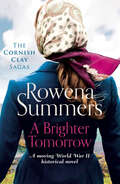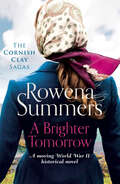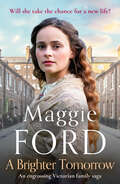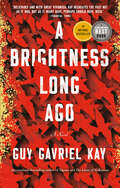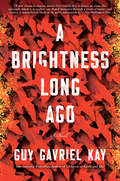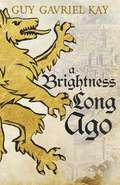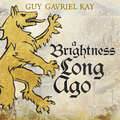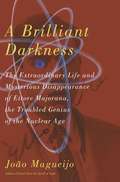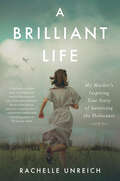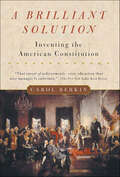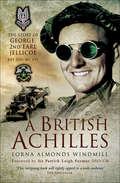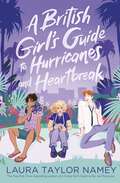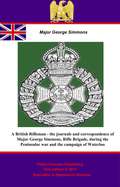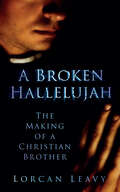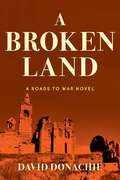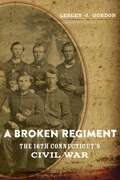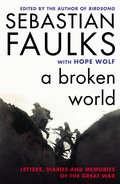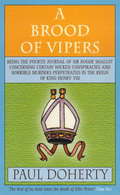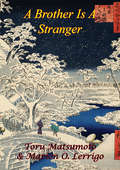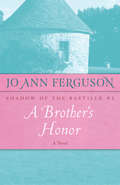- Table View
- List View
A Brighter Tomorrow (The Cornish Clay Sagas)
by Rowena SummersIn this moving World War II saga, a Cornish woman welcomes four children evacuated from London and ponders her family&’s future. In 1940, the comparative calm is disrupted by the arrival of four evacuees from London. While Skye welcomes the new additions with open arms, the other family members have mixed reactions. As, one by one, friends and family are reported missing or killed, Skye is forced to accept that their Cornish luck may be slipping. But Skye has always shared her grandmother&’s passion of keeping the old family business alive, but as the war drags on, she must decide whether the struggles of her family is worth it for an old woman&’s dream. This finale to the Cornish Clay series is perfect for fans of Rosie Goodwin, Katie Flynn, and Lesley Pearse.
A Brighter Tomorrow: A moving World War II historical novel (Cornish Clay Sagas)
by Rowena SummersShe has the chance to make her family's dream come true, but is it worth the price? In 1940, the comparative calm is disrupted by the arrival of four evacuees from London. While Skye welcomes the new additions with open arms, the other family members have mixed reactions. As, one by one, friends and family are reported missing or killed, Skye is forced to accept that their Cornish luck may be slipping.But Skye has always shared her grandmother’s passion of keeping the old family business alive, but as the war drags on, she must decide whether the struggles of her family is worth it for an old woman’s dream.The beautiful and deeply moving finale to the Cornish Clay series, A Brighter Tomorrowis a triumph, perfect for fans of Rosie Goodwin, Katie Flynn and Lesley Pearse
A Brighter Tomorrow: An engrossing Victorian family saga
by Maggie FordShe has the chance for a new life, but will she take it?When their mother dies of pneumonia, Ellie and her younger sister Dora are left alone in the world. Their hard-drinking, womanising father has abandoned them, and they cannot afford the rent on their East End tenement alone. Ellie is proud but she cannot turn down an offer of help from Doctor Lowe, a kindly man who sees Ellie as the replacement for his own recently deceased daughter.Though Doctor Lowe’s motives are misguided, his kindness offers Ellie and Dora an opportunity to escape the poverty of their background and make something of themselves. But will Ellie risk her chance at a new life for revenge on her father? An enthralling Victorian saga of family and female independence, perfect for fans of Maggie Hope and Val Wood.
A Brightness Long Ago
by Guy Gavriel KayFrom the internationally bestselling author of Tigana and The Lions of Al-Rassan comes a masterful new novel set in a vivid world evoking early Renaissance Italy and offering an extraordinary cast of characters whose lives come together through destiny, love, and ambition.In a chamber overlooking the nighttime waterways of a maritime city, a man recalls his youth and the people who shaped his life. Danio Cerra's intelligence won him entry to a renowned school even though he was only the son of a tailor. He took service at the court of a count--and soon learned why that man was known as the Beast.Danio's fate changed the moment he recognized Adria Ripoli as she entered the Beast's chambers one autumn night, intending to kill. Born to power, Adria had chosen, instead of a life of comfort, one of danger--and freedom--which is how she encounters Danio in a perilous time and place.Unforgettable figures share the unfolding story. Among them: a healer determined to defy her expected lot; a charming, frivolous son of immense wealth; a powerful religious leader more decadent than devout; and, affecting all these lives and many more, two larger-than-life mercenary commanders, lifelong adversaries, whose rivalry puts a world in the balance.A Brightness Long Ago offers both compelling drama and deeply moving reflections on the nature of memory, the choices we make in life, and the role played by the turning of Fortune's wheel.
A Brightness Long Ago
by Guy Gavriel KayFrom the internationally bestselling author of Tigana and The Lions of Al-Rassan comes a masterful new novel set in a vivid world evoking early Renaissance Italy and offering an extraordinary cast of characters whose lives come together through destiny, love, and ambition.In a chamber overlooking the nighttime waterways of a maritime city, a man recalls his youth and the people who shaped his life. Danio Cerra's intelligence won him entry to a renowned school even though he was only the son of a tailor. He took service at the court of a count--and soon learned why that man was known as the Beast.Danio's fate changed the moment he recognized Adria Ripoli as she entered the Beast's chambers one autumn night, intending to kill. Born to power, Adria had chosen, instead of a life of comfort, one of danger--and freedom--which is how she encounters Danio in a perilous time and place.Unforgettable figures share the unfolding story. Among them: a healer determined to defy her expected lot; a charming, frivolous son of immense wealth; a powerful religious leader more decadent than devout; and, affecting all these lives and many more, two larger-than-life mercenary commanders, lifelong adversaries, whose rivalry puts a world in the balance.A Brightness Long Ago offers both compelling drama and deeply moving reflections on the nature of memory, the choices we make in life, and the role played by the turning of Fortune's wheel.
A Brightness Long Ago
by Guy Gavriel KayInternational bestselling author Guy Gavriel Kay's latest work is set in a world evoking early Renaissance Italy and offers an extraordinary cast of characters whose lives come together through destiny, love, and ambition. In a chamber overlooking the nighttime waterways of a maritime city, a man looks back on his youth and the people who shaped his life. Danio Cerra's intelligence won him entry to a renowned school even though he was only the son of a tailor. He took service at the court of a ruling count—and soon learned why that man was known as the Beast. Danio's fate changed the moment he saw and recognized Adria Ripoli as she entered the count's chambers one autumn night—intending to kill. Born to power, Adria had chosen, instead of a life of comfort, one of danger—and freedom. Which is how she encounters Danio in a perilous time and place.Vivid figures share the unfolding story. Among them: a healer determined to defy her expected lot; a charming, frivolous son of immense wealth; a powerful religious leader more decadent than devout; and, affecting all these lives and many more, two larger-than-life mercenary commanders, lifelong adversaries, whose rivalry puts a world in the balance.A Brightness Long Ago offers both compelling drama and deeply moving reflections on the nature of memory, the choices we make in life, and the role played by the turning of Fortune's wheel.
A Brightness Long Ago
by Guy Gavriel Kay'The greatest living author of epic fantasy' - Brandon Sanderson 'The finest in his field' - Tor.com 'Guy Gavriel Kay's A Brightness Long Ago is a masterpiece; perhaps the finest work of one of the world's greatest living storytellers' - Fantasy Book Review ***One of Goodreads' Most Anticipated SFF Books of 2019*** Internationally bestselling author Guy Gavriel Kay's latest work is set in a world evoking early Renaissance Italy, with an extraordinary cast of characters. In a chamber overlooking the nighttime waterways of a maritime city, a man looks back on his youth and the people who shaped his life. Danio Cerra's intelligence won him entry to a renowned school, though he was only the son of a tailor. He took service at the court of a ruling count - and soon learned why that man was known as The Beast. Danio's fate changed the moment he recognized Adria Ripoli as she entered the count's chambers one night - intending to kill. Born to power, Adria had chosen a life of danger - and freedom - instead. Other vivid figures share the story: a healer determined to defy her expected lot; a charming, frivolous son of immense wealth; a religious leader more decadent than devout; and, affecting these lives and many more, two mercenary commanders, whose rivalry puts a world in the balance. Further praise for Guy Gavriel Kay 'Contemporary fiction's finest fantasist' Tor.com 'History and fantasy rarely come together as gracefully or readably as they do in the novels of Guy Gavriel Kay' Washington Post 'One of the (if not the) premiere fantasists of our time' The Financial Times 'Compulsively readable . . . Kay is a global phenomenon . . . a storyteller on the grandest scale' Time Magazine (Canada)
A Brightness Long Ago
by Guy Gavriel KayInternationally bestselling author Guy Gavriel Kay's latest work is set in a world evoking early Renaissance Italy, with an extraordinary cast of characters.In a chamber overlooking the nighttime waterways of a maritime city, a man looks back on his youth and the people who shaped his life. Danio Cerra's intelligence won him entry to a renowned school, though he was only the son of a tailor. He took service at the court of a ruling count - and soon learned why that man was known as The Beast.Danio's fate changed the moment he recognized Adria Ripoli as she entered the count's chambers one night - intending to kill. Born to power, Adria had chosen a life of danger - and freedom - instead.Other vivid figures share the story: a healer determined to defy her expected lot; a charming, frivolous son of immense wealth; a religious leader more decadent than devout; and, affecting these lives and many more, two mercenary commanders, whose rivalry puts a world in the balance. A Brightness Long Ago offers both compelling drama and deeply moving reflections on the nature of memory, the choices we make in life, and the role played by the turning of Fortune's wheel.(P)2019 Hodder & Stoughton LimitedPraise for Guy Gavriel KayPraise for Guy Gavriel Kay 'The greatest living author of epic fantasy' Brandon Sanderson 'Contemporary fiction's finest fantasist' Tor.com 'History and fantasy rarely come together as gracefully or readably as they do in the novels of Guy Gavriel Kay' Washington Post 'One of the (if not the) premiere fantasists of our time' The Financial Times 'Compulsively readable . . . Kay is a global phenomenon . . . a storyteller on the grandest scale' Time Magazine (Canada)(P) 2019 Hodder & Stoughton Ltd
A Brilliant Darkness: The Extraordinary Life and Mysterious Disappearance of Ettore Majorana, the Troubled Genius of the N
by João MagueijoOn the night of March 26, 1938, nuclear physicist Ettore Majorana boarded a ship, cash and passport in hand. He was never seen again. <P><P> In A Brilliant Darkness, theoretical physicist João Magueijo tells the story of Majorana and his research group, "the Via Panisperna Boys," who discovered atomic fission in 1934. As Majorana, the most brilliant of the group, began to realize the implications of what they had found, he became increasingly unstable. Did he commit suicide that night in Palermo? Was he kidnapped? Did he stage his own death? A Brilliant Darkness chronicles Majorana's invaluable contributions to science--including his major discovery, the Majorana neutrino--while revealing the truth behind his fascinating and tragic life.
A Brilliant Life: My Mother's Inspiring True Story of Surviving the Holocaust
by Rachelle UnreichThe powerful, true story of a Holocaust survivor told by her daughter—a tale that reminds us of the resilience of the soul and the ability of the heart to heal.As Mira is nearing the end of her life, her daughter Rachelle wants to find out how her mother had lived through four concentration camps, including Auschwitz, and a Death March. There was a mystery to her survival, it seemed—which perhaps had something to do with the strange things that always happened around her. And, incredibly, when giving testimony later in life, she says that it was during this time—despite witnessing the depths of man’s cruelty—that she learned about “the goodness of people.”Born in Czechoslovakia, Mira was only 12 years old when World War II broke out. At 88, living in Australia, she is diagnosed with cancer, and her journalist daughter decides to interview her to distract her from her illness. What Rachelle discovers about her mother helps her fit together the jigsaw pieces of her own life. A Brilliant Life portrays not only how remote a prospect it was to live through the Holocaust, but what it is like to be the child of a survivor. A story of love, loss, wonder and the deepest kind of faith, A Brilliant Life questions the role that fate, chance and destiny play in one's life. It is a tribute to family, a story of incredible resilience and a chronicle of the deep connection between mother and child that not even death can destroy.
A Brilliant Solution: Inventing the American Constitution
by Carol BerkinHistorian Carol Berkin's A Brilliant Solution: Inventing the American Constitution is a rich narrative portrait of post-revolutionary America and the men who shaped its political future. "Just as the Constitution was a brilliant solution to the problems of the 1780s, Carol Berkin's book is a brilliant account of the making of that constitution. Written with great verve and clarity, it nicely captures all the contingency and unpredictability in the framing of the Constitution."—Pulitzer Prize-winning author Gordon S. WoodThough the American Revolution is widely recognized as our nation's founding story, the years immediately following the war — when our government was a disaster and the country was in a terrible crisis — were in fact the most crucial in establishing the country's independence. The group of men who traveled to Philadelphia in the summer of 1787 had no idea what kind of history their meeting would make. But all their ideas, arguments, and compromises — from the creation of the Constitution itself, article by article, to the insistence that it remain a living, evolving document — laid the foundation for a government that has surpassed the founders' greatest hopes. Revisiting all the original historical documents of the period and drawing from her deep knowledge of eighteenth-century politics, Carol Berkin opens up the hearts and minds of America's founders, revealing the issues they faced, the times they lived in, and their humble expectations of success.
A British Achilles: The Story of George, 2nd Earl Jellicoe KBE DSO MC FRS
by Lorna Almonds Windmill&“Intriguing . . . describes a modest but exceptional man from whom the contemporary soldier, politician, and citizen can learn how to enjoy life (and how not to).&” —The Spectator Son of the victor of Jutland, George Jellicoe has enjoyed power and privilege but never shirked his duty. His war exploits are legendary and, as a founder member of Stirling&’s SAS and first commander of the Special Boat Service, he saw action a-plenty. A brigadier at twenty-six with a DSO and MC, he liberated Athens as the Germans withdrew and saved Greece from a Communist revolution. After the war, Jellicoe joined the Foreign Office and worked with spies Guy Burgess, Kim Philby, and Donald Maclean in Washington and on the Soviet Desk. His political life saw him in the Cabinet of the Heath Government and he is frank with his biographer over the issues and characters of his fellow ministers. Jellicoe&’s Achilles heel is his weakness for, and attraction to, women. His resignation over an involvement with a prostitute was a national scandal, but he is refreshingly honest and devoid of self-justification. He remained an active member of the Lords pursuing a top-level business career. A British Achilles is a superb biography of a major public figure and exemplary wartime soldier.
A British Education Control Officer in Occupied Germany, 1945–1949: The Letters of Edward Aitken-Davies (Routledge Studies in Modern European History)
by David PhillipsEdward Aitken-Davies (1899-1981) served as an Education Control Officer in the British Zone of occupied Germany from the early summer of 1945 until December 1949. He thus experienced the implementation of policy in the Zone from the very beginnings of the occupation until the founding of the Federal Republic of German y in 1949. During the period 1945 to 1947 he wrote weekly letters home to his mother. Those letters, together with the many speeches he gave in Germany during his time as a leading British officer in the Hanover region have not hitherto been available to researchers but can now be made accessible in edited form. The letters are placed in the context of developments in British policy and with explanatory notes on the detail. Taken together, his letters and other documents provide insights into the day-to-day lives of the impressive group of individuals who oversaw the development of education in Germany from post-war chaos to the reform and stability which restored the education system of the country to a pre-eminent status in Europe.
A British Girl's Guide to Hurricanes and Heartbreak (Cuban Girl's Guide Ser.)
by Laura Taylor NameyIn this highly anticipated companion to the New York Times bestseller and Reese Witherspoon x Hello Sunshine Book Club YA Pick A Cuban Girl&’s Guide to Tea and Tomorrow, Flora Maxwell heads to Miami to find a path for her future . . . and finds her heart along the way. &‘Swoony, delicious and heartfelt. Every page feels like a warm hug.&’ Emma Lord, author of Tweet Cute &‘Exactly the kind of love story I love most&’ Jenna Evans Welch, author of Love & Gelato Winchester has always been home for Flora, but when her mother dies, Flora feels untethered. Her family expects her to apply to university and take a larger role in their tea-shop business, but Flora isn&’t so sure. More than ever, she&’s the chaotic 'hurricane' in her household, and she doesn&’t always know how to manage her stormy emotions. So she decides to escape to Miami without telling anyone – especially her longtime friend Gordon Wallace. But Flora&’s tropical change of scenery doesn't cast away her self-doubt. When it comes to university, she has no idea which passions she should follow. That&’s also true in romance. Flora&’s summer abroad lands her in the flashbulb world of teen influencer Baz Marín, a Miami Cuban who shares her love for photography. But Flora&’s more conflicted than ever when she begins to see future architect Gordon in a new light.PRAISE FOR A CUBAN GIRL'S GUIDE TO TEA AND TOMORROW: 'An absolute delight' Rachael Lippincott, author of Five Feet Apart 'An utterly charming read that feels like a treasured recipe that will heal and feed a broken heart.' Nina Moreno, author of Don&’t Date Rosa Santos 'I could live inside Laura Taylor Namey&’s lush, vibrant words forever.' Rachel Lynn Solomon, author of Today Tonight Tomorrow 'This book. THIS BOOK. Laura Taylor Namey has written the coziest love story I&’ve ever had the pleasure to read.' Erin Hahn, author of You&’d Be Mine and More Than Maybe
A British Home Child in Canada 2-Book Bundle: Marjorie Her War Years / Marjorie Too Afraid to Cry
by Patricia SkidmoreThe biography of a British girl, split from her family by the British child migration program, learning to cope with her hard new life in Canada. Marjorie Too Afraid to Cry — Book #1 In 1937, 10-year-old Marjorie Arnison was shipped from Britain to Prince of Wales Fairbridge Farm School near Victoria, British Columbia. For years she wouldn't talk about her past. It wasn't until daughter Patricia explored archival records and shared them with her mother that a home-child saga emerged. Marjorie Her War Years — Book #2 Sent away from her family and England to an isolated farm where she was at the mercy of a tyrannical “cottage mother,” Marjorie Arnison had to learn to forget her identity in order to survive in her unfamiliar and hostile new home. It was only much later in her life that the memories of where she came from began to resurface.
A British Rifleman - the Journals and Correspondence of Major George Simmons, Rifle Brigade, during the Peninsular war and the campaign of Waterloo
by Lt.-Colonel Willoughby Cole Verner Major SimmonsThe journals and correspondence of George Simmons add a further lustre to the excellent memoirs and books that men of the 95th Rifles left of the adventures, hard fought actions and grim experiences of the Peninsular War and the Waterloo Campaign. Simmons was commissioned into the 1st Battalion 95th Rifles, a fellow officer of Sir John Kincaid and Sir Harry Smith both of whom left valuable memoirs of the period. A religious and upright man, although not priggish, he kept a journal of the actions movement and events of his life and sent numerous letters home to his family in Hull. These form the narrative which has been ordered by Lt. Col. Verner to flow in sequence through his time fighting Napoleon’s forces.Simmons, and his brothers who often crop up in the volume, was at the forefront of the fighting engaged in by the Light Brigade and later Light Division. He was wounded a number of times, once so seriously at Waterloo as a result of a musket wound to the chest, that his attendants though he might die. He took part in the battles of Fuentes D’Oñoro, Salamanca, Vittoria, the Nivelle, Orthez and finally Waterloo. The storming of Badajoz, Cuidad Rodrigo are also described in vivid detail missing nothing of the fear, death and mayhem of the attacking troops; to give just one excerpt of the action:- I saw my poor friend Major O'Hare lying dead upon the breach. Two or three musket balls had passed through his breast. A gallant fellow, Sergeant Flemming, was also dead by his side, a man who had always been with him. I called to remembrance poor O'Hare's last words just before he marched off to lead the advance. He shook me by the hand saying, "A Lieutenant-Colonel or cold meat in a few hours." I was now gazing upon his body lying stretched and naked amongst thousands more.An excellent read, contemporaneously written and abounding with interesting details.Author – Major George Simmons [1785-1858]Editor – Lt.-Col Willoughby Cole Verner [1852-1922]
A Broken Hallelujah: The Making of a Christian Brother
by Lorcan LeavyA Broken Hallelujah traces a young man’s path through the Christian Brothers’ regime from Juniorate through the Leaving Certificate year to Teacher Training, and from there to work ‘on the mission’. The author describes in intimate detail the experiences and challenges he faces on the way, culminating in the final and most difficult decision of all, whether or not to remain in the fold of the Brothers’ Congregation. This unique story recalls a type of education which has long since passed out of use, and has become, for many, a piece of history in itself. In detailing his experiences, the author describes the dilemmas faced by a great number of people, dilemmas which reflect many of the choices and difficulties that have shaped the Ireland of today.
A Broken Land: A Roads to War Novel (Roads to War)
by David DonachieThe second installment in Donachie's sweeping Roads to War series set in the pre-WWII European powder keg1936: Soldier of fortune Cal Jardine travels to Barcelona to help with the athletic games rivalling the Berlin Olympics. But as the first shots of civil war ring out, friendship, love, and political conviction converge to persuade Jardine to once again embroil himself in a foreign war.Discovering that the British athletes attending the games are keen to enlist for the fight, Jardine agrees to train them into a professional force. With old army comrade Vince Castellano and his beautiful interpreter Florencia Gardiola by his side, Jardine leads the athletes through the street battles of Barcelona and on to the fighting in the Catalan countryside. But when murderous betrayal blights his previous fortune, Jardine will go to any lengths to seek suitable revenge . . .
A Broken Regiment: The 16th Connecticut's Civil War (Conflicting Worlds: New Dimensions of the American Civil War)
by Lesley J. GordonA Broken Regiment recounts the tragic history of one of the Civil War's most ill-fated Union military units. Organized in the late summer of 1862, the 16th Connecticut Volunteer Infantry was unprepared for battle a month later, when it entered the fight at Antietam. The results were catastrophic: nearly a quarter of the men were killed or wounded, and Connecticut's 16th panicked and fled the field. In the years that followed, the regiment participated in minor skirmishes before surrendering en masse in North Carolina in 1864. Most of its members spent months in southern prison camps, including the notorious Andersonville stockade, where disease and starvation took the lives of over one hundred members of the unit. The struggles of the 16th led survivors to reflect on the true nature of their military experience during and after the war, and questions of cowardice and courage, patriotism and purpose, were often foremost in their thoughts. Over time, competing stories emerged of who they were, why they endured what they did, and how they should be remembered. By the end of the century, their collective recollections reshaped this troubling and traumatic past, and the "unfortunate regiment" emerged as the "Brave Sixteenth," their individual memories and accounts altered to fit the more heroic contours of the Union victory. The product of over a decade of research, Lesley J. Gordon's A Broken Regiment illuminates this unit's complex history amid the interplay of various, and often competing, voices. The result is a fascinating and heartrending story of one regiment's wartime and postwar struggles.
A Broken World: Letters, Diaries and Memories of the Great War
by Sebastian Faulks with Hope WolfA lieutenant writes of digging through bodies that have the consistency of Camembert cheese; a mother sends flower seeds to her son at the Front, hoping that one day someone may see them grow; a nurse tends a man back to health knowing he will be court-martialled and shot as soon as he is fit. Edited by the bestselling author of Birdsong and Dr Hope Wolf, this is an original and illuminating non-fiction anthology of writing on the First World War.Diaries, letters and memories, testaments from ordinary people whose lives were transformed, are set alongside extracts from names that have become synonymous with the war, such as Siegfried Sassoon and T.E. Lawrence. A Broken World is an original collection of personal and defining moments that offer an unprecedented insight into the Great War as it was experienced and as it was remembered.
A Brood of Vipers (Tudor Mysteries, Book 4): A Tudor mystery of murder and espionage
by Paul DohertyRodger embarks on a mission to Florence, in search of an elusive assassin...In his fourth journal, A Brood of Vipers, Roger Shallot encounters treacherous conspiracies and terrible murders as he journeys from Tudor London to Florence. Paul Doherty's Tudor mysteries are perfect for fans of Susannah Gregory and C. J. Sansom.Spring 1523. Benjamin Daunbey and his rapscallion servant, Roger Shallot, are summoned to London. A Florentine envoy, Lord Francesco Abrizzi, has been murdered and King Henry is determined to unmask the perpetrators of this outrage. In London, Shallot experiences King Henry's rage, the insults of the Abrizzis and a murderous attack. Shallot, a born coward, wants to crawl away and hide, but the King and Wolsey insist that he and Benjamin go to Florence, find Abrizzi's assassin, deliver a secret message, and bring back a Florentine painter. It sounds simple enough - but the reality is murderously different.What readers are saying about Paul Doherty:'Paul Doherty weaves a tangled web of murder and intrigue''These novels vividly bring the dirt, squalor and adventure of Henry VIII's reign to life''Excellent story. Always enjoyed the Shallot stories, he is a lovable rouge'
A Brood of Vipers: A Tudor mystery of murder and espionage (Tudor Mysteries, Book #4)
by Paul DohertyRodger embarks on a mission to Florence, in search of an elusive assassin...In his fourth journal, A Brood of Vipers, Roger Shallot encounters treacherous conspiracies and terrible murders as he journeys from Tudor London to Florence. Paul Doherty's Tudor mysteries are perfect for fans of Susannah Gregory and C. J. Sansom.Spring 1523. Benjamin Daunbey and his rapscallion servant, Roger Shallot, are summoned to London. A Florentine envoy, Lord Francesco Abrizzi, has been murdered and King Henry is determined to unmask the perpetrators of this outrage. In London, Shallot experiences King Henry's rage, the insults of the Abrizzis and a murderous attack. Shallot, a born coward, wants to crawl away and hide, but the King and Wolsey insist that he and Benjamin go to Florence, find Abrizzi's assassin, deliver a secret message, and bring back a Florentine painter. It sounds simple enough - but the reality is murderously different.What readers are saying about Paul Doherty:'Paul Doherty weaves a tangled web of murder and intrigue''These novels vividly bring the dirt, squalor and adventure of Henry VIII's reign to life''Excellent story. Always enjoyed the Shallot stories, he is a lovable rouge'
A Brother Is A Stranger
by Marion O. Lerrigo Toru MatsumotoWe in Japan have a saying, "A brother is the beginning of a stranger," because on the father's death the oldest brother acquires such absolute authority as the head of the family that the younger ones and he cannot easily be friends. After our father died, my eldest brother assumed the dictatorial authority of father, as sanctioned by Japanese law and custom. I wanted to live my own life, and I did; but I had to fight for it against the old Japanese tradition that superiors must benevolently govern their inferiors, and inferiors gratefully obey. I have experienced both bitter sorrows and bursting joys. May the young people of a new Japan obtain the happiness of my wife and myself without the struggle we have been through.--A Word From the Author, Toru Matsumoto
A Brother's Honor
by Jo Ann FergusonWhen Dominic St. Clair, a French privateer, captures an American ship, he has the American officers transferred to his ship, offering them the respect of one officer for another. He even asks if they need to bring anything from their ship with them. The American captain says no, but then Dominic discovers Abigail Fitzgerald, the captain's daughter, has been left behind on the ship he now is overseeing. Abigail barely knows her father, for she has lived ashore with her aunt her whole life. She looked forward to getting to know him on this voyage. She cannot believe that he would leave her behind with the enemy. But he did. So begins the battle between Abigail and Dominic, but they must become allies when they barely survive the ship being blown up by her father's men. They reach the shore of England, where both are considered enemies. There they find both unexpected allies and an unexpected love. Even so, betrayal stalks them as lies long told draw them into a web of treachery and bring Dominic a heritage he never imagined would be his, for he is the heir of a duke killed during the Terror. Not that he will be able to claim his legacy unless he can escape their enemies and save Abigail for a horrible fate. Their two hearts must be as powerful as thunder and dare to grasp love in the midst of hatred.
